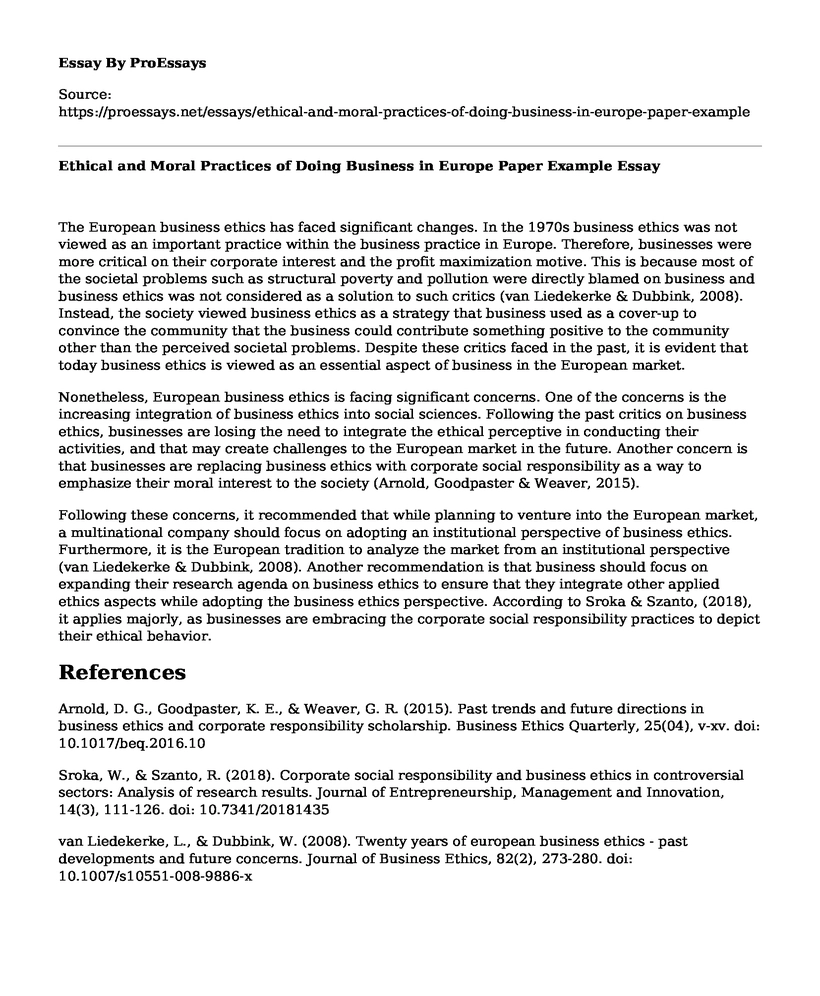The European business ethics has faced significant changes. In the 1970s business ethics was not viewed as an important practice within the business practice in Europe. Therefore, businesses were more critical on their corporate interest and the profit maximization motive. This is because most of the societal problems such as structural poverty and pollution were directly blamed on business and business ethics was not considered as a solution to such critics (van Liedekerke & Dubbink, 2008). Instead, the society viewed business ethics as a strategy that business used as a cover-up to convince the community that the business could contribute something positive to the community other than the perceived societal problems. Despite these critics faced in the past, it is evident that today business ethics is viewed as an essential aspect of business in the European market.
Nonetheless, European business ethics is facing significant concerns. One of the concerns is the increasing integration of business ethics into social sciences. Following the past critics on business ethics, businesses are losing the need to integrate the ethical perceptive in conducting their activities, and that may create challenges to the European market in the future. Another concern is that businesses are replacing business ethics with corporate social responsibility as a way to emphasize their moral interest to the society (Arnold, Goodpaster & Weaver, 2015).
Following these concerns, it recommended that while planning to venture into the European market, a multinational company should focus on adopting an institutional perspective of business ethics. Furthermore, it is the European tradition to analyze the market from an institutional perspective (van Liedekerke & Dubbink, 2008). Another recommendation is that business should focus on expanding their research agenda on business ethics to ensure that they integrate other applied ethics aspects while adopting the business ethics perspective. According to Sroka & Szanto, (2018), it applies majorly, as businesses are embracing the corporate social responsibility practices to depict their ethical behavior.
References
Arnold, D. G., Goodpaster, K. E., & Weaver, G. R. (2015). Past trends and future directions in business ethics and corporate responsibility scholarship. Business Ethics Quarterly, 25(04), v-xv. doi: 10.1017/beq.2016.10
Sroka, W., & Szanto, R. (2018). Corporate social responsibility and business ethics in controversial sectors: Analysis of research results. Journal of Entrepreneurship, Management and Innovation, 14(3), 111-126. doi: 10.7341/20181435
van Liedekerke, L., & Dubbink, W. (2008). Twenty years of european business ethics - past developments and future concerns. Journal of Business Ethics, 82(2), 273-280. doi: 10.1007/s10551-008-9886-x
Cite this page
Ethical and Moral Practices of Doing Business in Europe Paper Example. (2022, Nov 20). Retrieved from https://proessays.net/essays/ethical-and-moral-practices-of-doing-business-in-europe-paper-example
If you are the original author of this essay and no longer wish to have it published on the ProEssays website, please click below to request its removal:
- Ethical Theory: Ethical Egoism Essay Example
- Paper Example on Just-In-Time Technique in Supply Chain Management
- Social Physiology and Cognitive Dissonance Paper Example
- Research Paper on Leadership Personal Issues and the Rule of Law
- Essay on Manager-Employee Relationship: Cultivating a Positive Work Environment
- Project Planning: Time, Quality & Resources - Research Paper
- Fixed & Variable Expenses: Impacts on Production Outputs Essay Example







